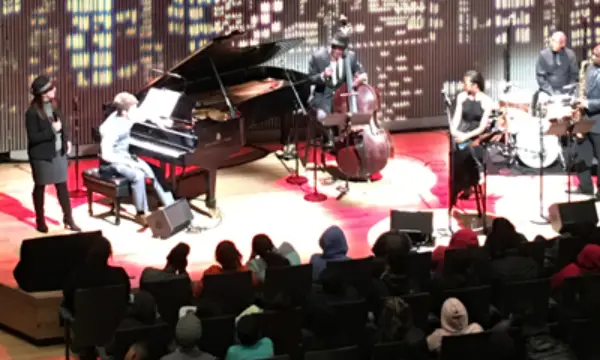- About
- Network
- Community
- Initiatives
- News
- Events
- Blog
- Publications

Libraries Expand Lifelong Learning Options through Broadband
Tags conference digital divide
With help from several state initiatives and high-speed broadband through CENIC, California public libraries provide online programs for adults to graduate high school, learn to speak English, earn industry-specific job certifications, gain 21st-century digital skills, and more.
Most Americans consider themselves lifelong learners and they look to libraries for programs and materials. A recent Pew Research report found that more than 74% of adults have sought out personal learning opportunities of various kinds in the past year, and more than 63% of full- and part-time workers have taken courses or done training to improve their job skills. Additionally, the report found that people who have access to high-speed Internet are much more likely to take advantage of learning opportunities.
High-speed Internet is a primary tool for libraries to provide lifelong learning opportunities. As a partner with California public libraries, CENIC aims to continue expanding broader and better Internet access across California and beyond to provide all residents with educational resources. About 70% of California libraries are connected to the CENIC network, giving them faster, more reliable, and more cost-effective Internet. Some libraries have increased speeds of 10 to 100 times their earlier capacity and have seen cost savings of up to 95%.
Earn a High School Diploma
Through Career Online High School, a program offered by the California State Library, adults can earn their high school diploma — not just a GED — and gain a career. The fully accredited, scholarship-based program offers free online classes to adults that enable them to finish high school and get a workforce certificate in one of 10 trade areas, including child care worker, home health aide, retail customer service, and commercial driving. CSL is currently accepting applications from libraries interested in offering the program.
Los Angeles Public Library was the first in the nation to offer Career Online High School. Assistant City Librarian for LAPL Susan Broman said a survey of recent graduates showed that 75% of graduates were employed, 40% were earning more money than before, and 40% had enrolled in higher education. One graduate had dropped out after the ninth grade, and had been homeless for years. He learned about the online high school program because he spent so much time at the library, reading books during the day and sleeping outside the building at night. After earning his diploma, he went on to attend community college.
Learn to Speak English
Through the Collaborative Connections Project, children and adults can practice speaking English at the library with workshops broadcast via online video-conferencing. The 49-99 Library Cooperative System, consisting mainly of rural libraries, received a grant under the Library Services and Technology Act (LSTA) to establish online meeting tools in remote libraries and to offer English language learner workshops and bilingual story times. At the Cesar Chavez Central Library in Stockton, the free program is live-streamed to libraries in Amador, Calaveras, Stanislaus, and Tuolumne Counties.
In California, 44% of residents speak a language other than English at home, according to the latest census data. Suzy Daveluy, deputy director/city librarian for Stockton-San Joaquin County Public Library, said about one-third of residents in the 49-99 library system are Spanish-speaking with limited English skills, and the language barrier makes it difficult for them to fully participate in their communities. “The beauty of the CENIC connection is that it brings us all together,” she said. “We can connect with other libraries and reach completely new and different audiences.” (Learn about current grant funding opportunities through the LSTA.)

Participants in Collaborative Connections video conference practice speaking English with others at libraries, many in remote locations.
Master a New Skill
Library patrons need only their library card to gain new skills for their job, train for a new career, or cultivate a new hobby. The Sacramento Public Library offers a plethora of continuing education services from resume writing to expert-level video tutorials to personal development courses.
Through the resume review service, people can email their resume to a job coach for review and get edits and feedback within 24 hours. The library’s subscription to Lynda.com offers a collection of thousands of online educational courses teaching everything from photography and computer coding to money management and business skills. Additional programs offer help using a smartphone, learning basic computer skills, starting a new business, designing for and using a 3D printer, creating a studio-quality music recording, developing a video game, and more.
Ever-Increasing Learning and Technology
People with access to the Internet are more likely to take advantage of learning opportunities. Pew Research found that of people who have both a smartphone and a home broadband connection, 82% have done some personal learning activity in the past year. For the remaining adults (those with just one of these connection devices or neither of them), 64% have done personal learning in the past year.
With ever-increasing advancements in information and technology, continuing education has never been more important. Every day, libraries are leveraging their robust CENIC connection to expand lifelong learning programs and provide access to education to everyone.
Watch the panel discussion, “California Public Libraries Provide Adults Tools to Graduate High School,” and check out more content from the 2019 CENIC Conference.
Related Reading:
- Public Libraries and 21st Century Digital Equity Goals
- Aspen Institute Offers Strategies for Using High-Speed Broadband in California to Drive Equity, Learning Innovation, and Civic Participation
Related blog posts
The Venue is the World: CENIC Helps SFJAZZ Share Music with Everyone
Learn how Mount Allen shares musical experiences with the public through his role at San Francisco Jazz (SFJAZZ), which uses CENIC infrastructure to livestream performances to classrooms and libraries across the state.
Adaptive Teaching and Learning: Artificial Intelligence in the K-12 Environment
VCOE's Julie Judd and Dana Thompson address using AI in the K12 classroom at CENIC's Biennial conference "The Right Connection," touching on adaptive teaching, administration, and privacy.


